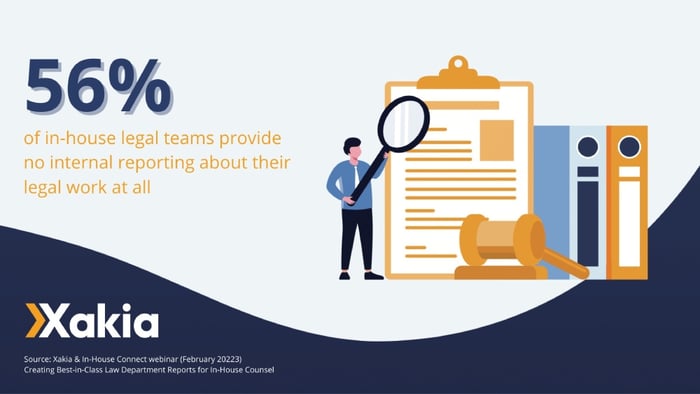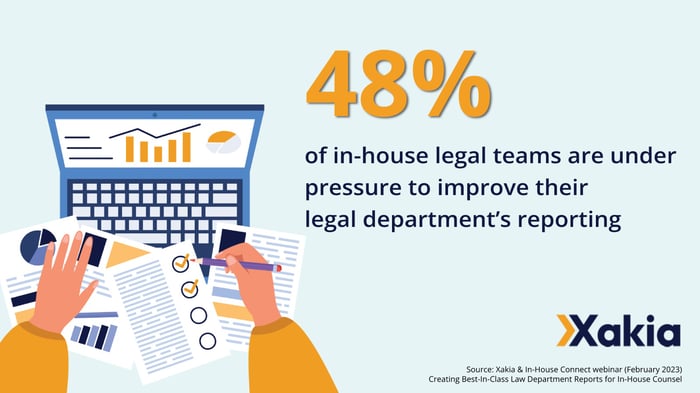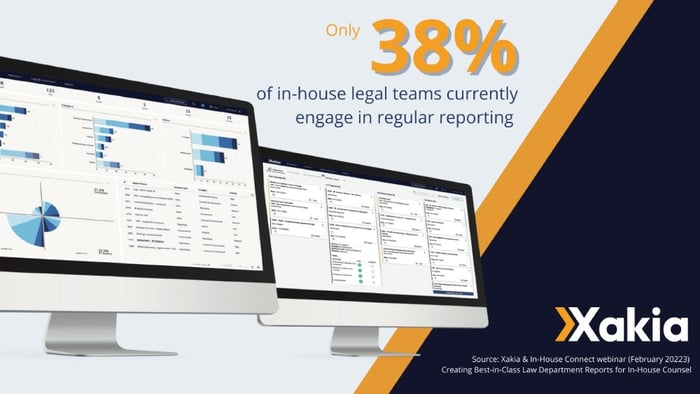There was incredible engagement across nearly 400 in-house members during the 'Best in Class Legal Reporting' webinar with the In-House Connect community. A staggering level of interest in the need for Legal Department reporting to internal stakeholders suggests this is the next bastion for corporate legal teams to conquer in their journey to digitize their teams.
With in-house Legal Departments increasingly under pressure for more transparency and accountability, it was an eye-opener to see the webinar poll stats that only 38% of in-house legal teams engage in regular reporting, while 56% provide no internal reporting about their legal work at all. Considering that nearly 50% of in-house legal teams are feeling the pressure to improve reporting, the time is ripe to take action.
It’s likely that for the 56% who are not reporting at all, there is a measure of “we’ve always done it this way” or “I have a good relationship with my CEO.” This type of approach is quickly falling by the wayside in favor of data driven decision-making. Providing legal reports to your stakeholders is an important opportunity to spot trends, identify gaps, maximize resourcing, and to demonstrate the enormous value delivered by your legal team.

Why are in-house Legal Departments not reporting on their legal work?
There are several reasons why in-house legal teams may struggle with reporting, including:
1. Lack of resources
Many in-house corporate Legal Departments are small and may not have dedicated staff to handle reporting. This can lead to a lack of time and resources to collect, analyze, and report on data.
2. Complexity of data
Legal data can be complex and difficult to analyze. For example, a legal matter often involve a large volume of documents and data that need to be reviewed, and different types of legal matters may require different types of reporting.
3. Lack of legal technology
Corporate Legal Departments may not have access to legal analytics software and the necessary legal technology tools needed to effectively collect and analyze data. This can make it difficult to generate accurate and actionable Legal Department reports.
4. Lack of clear reporting objectives
In some cases, in-house legal teams may not have a clear understanding of what they want to achieve with their reporting. This can make it difficult to collect and analyze the right data and produce reports that are useful and relevant to the organization.
5. Confidentiality concerns
Legal matters often involve confidential information, which can make it difficult to share data and reports with other departments or stakeholders within the organization. This can limit the usefulness of legal reporting and make it challenging to collaborate effectively with other teams.

The market is advancing quickly and the appetite for legal data is growing. You hear the chatter. So, rather than wake up in a cold sweat at 3am fearing the “where’s the data” question, take the bull by the horns and plan your first steps.
Tips to get started with legal reporting
The good news is that a few easy steps can quickly eliminate analysis paralysis and get you moving on a pathway to impactful legal reporting. There's no need to boil the ocean, so simplify the process as much as possible at the beginning and iterate as you progress. The key is just get started.
Consider these six steps below to help you get started with legal reporting.
1. Identify key metrics
Determine what key metrics should be tracked to measure the effectiveness of the legal team. These metrics could include things like the number of matters handled, tracking budget and legal spend, time to resolution and compliance metrics.
2. Define reporting requirements
Identify your audience and their key drivers. Determine who needs to receive the reports and what level of detail is required. For example, legal reports to the CEO and Board will be different to legal reports to business unit clients. This will help ensure that your legal reports are customized to meet the needs of the intended audience.
3. Establish data collection processes
Establish processes for collecting the data needed to generate your legal reports. This could involve leveraging existing systems, such as Excel, or implementing new ones to capture the necessary data, such as a legal matter management software.
4. Standardize reporting
Standardize the format and content of legal reports to make them consistent and easy to understand. This can help ensure that stakeholders can quickly and easily identify key insights.
5. Automate legal reporting
Use legal analytics software and legal technology to automate the reporting process. This can help reduce the time and effort required to generate reports and increase the frequency of reporting.
6. Review and refine
Regularly review and refine reporting processes to ensure that they remain effective and relevant. Solicit feedback from stakeholders and make changes as needed to continuously improve reporting.

By taking these easy steps, in-house legal teams can improve reporting, gain greater insights, and provide stakeholders with the information they need to make informed decisions. The time has never been better, and the tools more accessible, for Legal Departments to better position themselves as strategic partners rather than reactive service providers.
Put your legal reporting wheels in motion now!
Demonstrate the value of your Legal Department to your organization - download our Best-In-Class Legal Reporting white paper now to learn what your reports should include, and how to tailor the content for your various stakeholders. You can also watch the 'Creating Best-in-Class Law Department Reports' webinar on demand here. If you would like to learn how a legal analytics software can help generate regular reports for your stakeholders, get in touch with the Xakia team today for a free demo.